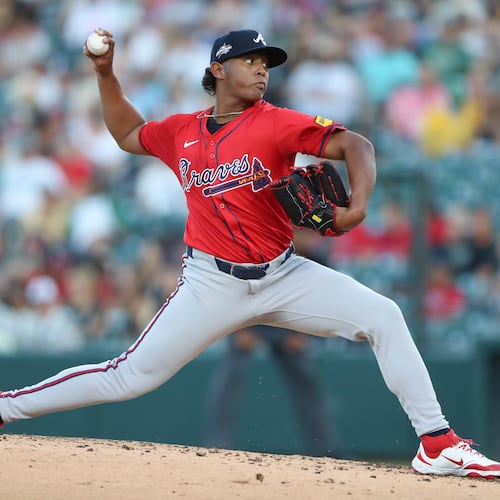As the World Series opens without them Tuesday for the 20th consecutive year, the Braves will approach the offseason with money to spend – and no shortage of ways to consider spending it.
The Braves finished the 2019 season with a major-league player payroll of about $138 million, up 6% from 2018. Because much of that total was in one-year or expiring contracts, the Braves could have more than $80 million to allocate in the coming months, whether on holdover players they retain or new players they acquire, to get back to a $138 million payroll for next season.
“I think from a contractual standpoint we’re in very good shape, so there’s a lot of options going into the winter,” Braves general manager Alex Anthopoulos said last week. “… We don’t have a full grasp of the landscape (of available players) yet. We will probably in the next month to six weeks.”
Braves owner Liberty Media stated in a recent filing that the team had about $40 million on the books for 2020 in guaranteed long-term contracts as of June 30. That figure, which apparently included the multi-year deals with first baseman Freddie Freeman, second baseman Ozzie Albies and outfielders Ronald Acuna and Ender Inciarte, as well as the buyouts in several other contracts, increased to about $54 million with the July 31 acquisition of relief pitcher Mark Melancon, whose $14 million salary next year became the Braves’ responsibility.
How the Braves allocate the rest of their 2020 payroll – and whether they increase it from the 2019 level, which ranked 14th among the 30 MLB teams – will play out gradually through the offseason.
A big chunk of the Braves' potential spending power would go to third baseman Josh Donaldson, if they are able to re-sign him. Eligible to become a free agent one day after the World Series ends, Donaldson is expected to command a multi-year contract, probably with a higher salary in 2020 than this year's $23 million.
The Braves have nine other players who can file for free agency: starting pitcher Dallas Keuchel; relief pitchers Chris Martin, Josh Tomlin, Darren O’Day, Jerry Blevins and Anthony Swarzak; outfielder Matt Joyce; infielder Adeiny Hechavarria; and catcher Francisco Cervelli. The Braves could bring back several of them if the price is right – maybe Martin, O’Day and/or Tomlin for the bullpen; maybe Joyce as a platoon outfielder. Keuchel, who made $13 million for a partial season in 2019, seems likely to move on. If O’Day returns, it would be for far less than this year’s $9 million.
The Braves have until five days after the World Series to make decisions on three players whose contracts have club options for next season: starting pitcher Julio Teheran ($12 million salary or $1 million buyout), outfielder Nick Markakis ($6 million salary or $2 million buyout) and catcher Tyler Flowers ($6 million salary or $2 million buyout). The pending decisions on those options involve up to a $19 million swing -- $24 million to bring back all three players, $5 million to let all three go. (The Braves won't pick up their option on outfielder Billy Hamilton.)
By Dec. 2, the Braves must decide which of their nine arbitration-eligible players to tender 2020 contracts. Those offered contracts, as most of the nine likely will be, can have their salaries set in arbitration; those non-tendered become free agents.
Here are the Braves' arbitration-eligible players and the projections by MLBTradeRumors.com's salary arbitration model of how much they would get: shortstop Dansby Swanson ($3.3 million); starting pitcher Mike Foltynewicz ($7.5 million); relief pitchers Shane Greene ($6.5 million), Luke Jackson ($1.9 million) and Grant Dayton ($800,000); outfielder Adam Duvall ($3.8 million); utilitymen Johan Camargo ($1.6 million) and Charlie Culberson ($1.8 million); and catcher John Ryan Murphy ($1.2 million). If the Braves were to offer contracts to all of their arbitration-eligible players, the group's projected salaries would total $28.4 million.
How much the Braves spend to retain their 2019 players who have arbitration eligibility, club options or free-agent rights will affect how aggressive Anthopoulos can be in pursuing players from outside the organization via trades or free agency. There’s no shortage of places resources could be deployed – catcher, third base, outfield, pitching.
“We can get better in all areas – offense, defense, bullpen, rotation – and we plan on doing that,” Anthopoulos said last week. “We just don’t know what opportunities will present themselves.”
Elite starting pitchers tend to be extremely expensive on the free-agent and trade markets, but the Washington Nationals' sweep of St. Louis in the NL Championship Series underscored the Braves' continuing need in that area. While the Nationals' stellar rotation is led by veteran co-aces Max Scherzer and Stephen Strasburg, the Braves' best pitcher this year was rookie Mike Soroka, who was great on the road (1.55 ERA) and middling at SunTrust Park (4.14 ERA, including 5.12 after June 1). He and fellow pre-arbitration starter Max Fried will remain inexpensive next season.
Of course, top-of-rotation starters are quite expensive on the free-agent and trade markets.
“Generally speaking, the free-agent market is not how you want to build a roster,” Anthopoulos said. “Likely, to be the winning bid, you’re paying a few more million per year or (going) a year or two more than you want. … I think it’s been shown that’s not the way to go about it.”
Still, he didn’t rule out anything, calling the Braves’ stance on potential long-term free-agent deals “case-specific.”
However it plays out, it should be an intriguing offseason as the Braves again try to formulate a roster that can win a playoff series for the first time since 2001 and reach the World Series for the first time since 1999.
About the Author
Keep Reading
The Latest
Featured

